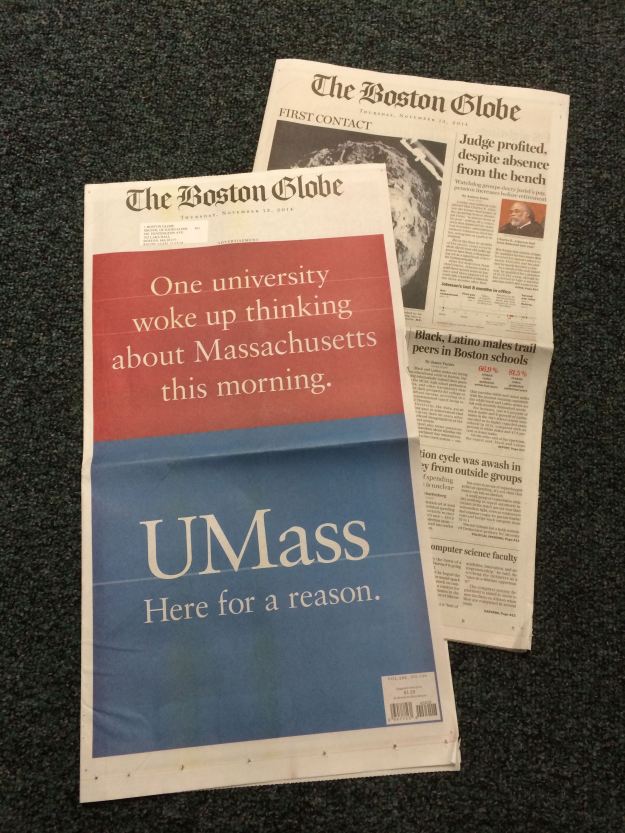 The Boston Globe has all age groups covered in its expanded Business section, which debuts today.
The Boston Globe has all age groups covered in its expanded Business section, which debuts today.
For younger readers, there is this story, by Stefanie Friedhoff, on a start-up that sells highly reflective paint to make bicycles more visible in the dark.
And for old folks like me, tech columnist Hiawatha Bray has advice for what to do about the blizzard of passwords you want your loved ones to be able to access after you’ve departed this vale of tears. I’m going to bookmark that one.
When it comes to newspapers, more is better. The section offers a nice mix of stories and is attractively designed. (I took a rare peek at the replica edition so that I could see what it looks like in print.) And for those who still care about such things, Business is once again a standalone section.
To its credit, the Globe has also assigned reporter Katie Johnston to cover “workplace and income inequality.” I’d like to see her reporting supplemented with a strong, opinionated voice along the lines of the way columnist Shirley Leung chronicles the local power players.
Here’s the press release:
The Boston Globe Launches New and Expanded Standalone Business Section
Tuesday through Friday section, with new staff and features, debuts December 4; launch sponsored by University of Massachusetts
Boston (Dec. 4, 2014) — The Boston Globe today launches a new and expanded business section. Tuesday through Friday, and Sunday, the print version of Business will be a standalone section, giving it a more prominent position in the newspaper.
The new section — also on BostonGlobe.com — debuts at a time when Boston and the region is at the front-end of an unprecedented period of growth. The section will cover the power players and big-thinkers helping to make the area a national hub for innovation, as well as those struggling to raise their economic standing in a state with some of the nation’s highest housing and energy costs.
Readers can also expect more personalities, more strong-voiced writing, and more dramatic design. It’s a section that reflects the fact that people work in many different ways these days, and that jobs intersect with private lives in ways that weren’t imagined not so long ago. It’s not just about what people do for work, but how they do it, where they do it, and what they do after work. It’s about business as part of life.
“When we at the Globe think about business as a subject, it encompasses so much more than stock prices and mergers, profits and losses,” said Mark Pothier, Globe business editor. “There are bold ideas and life stories behind every business and business decision. There are people leading the way and those who are left behind. We want to make the section relevant to a much broader range of readers than a traditional business section.”
New features include:
- Bold Types: A destination for anyone interested in who’s doing what. Think of this as the Business version of the popular Names column in the Metro section, with CEOs and startup geniuses instead of movie stars.
- Talking Points: A fast-paced summary of what the time-starved business person needs to start the day — from local to national to global
- Agenda: What’s on tap for tomorrow and what might you want to attend? This could feature events like the next Federal Reserve meeting, a product giveaway or charity event
- Workspace: Highlights trends and unusual workspaces, from the back of a bus to ultra-hip high tech offices
- Build: Covers real estate, new projects and architecture
- Double Shot: Washington-based reporter Matt Viser’s column expands from politics to focus on the coffee-drinking habits of businesspeople.
- The Download: A brisk digital dossier of someone in the business world – their social media habits, last photo taken, most-used apps and more
- Business Lunch: Everything from the hot spots to get business done to the eating habits of the power brokers
- There and Back: From commuting horror stories to favorite destinations for conferences to travel tips from airport veterans
- Shop: New stores, new trends, new products, good deals, potential scams and more
- Number of the Day: One number can say a lot
In advance of the new section, Cynthia Needham, formerly the Globe’s political editor, joined Business.
New hires include Jon Chesto, formerly managing editor of the Boston Business Journal, and Sacha Pfeiffer, formerly senior reporter and host of WBUR’s “All Things Considered.” Prior to joining WBUR six years ago, Pfeiffer spent a decade at the Globe, most notably as part of the Spotlight Team that won the Pulitzer Prize for reporting on the clergy abuse scandal. She will cover nonprofits, venture capital, philanthropy, and the people and motivations behind them.
The new section also includes coverage from BetaBoston.com, the source for innovation and tech news, from the latest start-ups to the newest biotechnology breakthrough. BetaBoston.com will also share and link to the expanded Globe business coverage.
The University of Massachusetts (UMass) is the section launch sponsor. “As the state’s largest university, we are always following changes and trends in the regional business landscape,” said Robert P. Connolly, UMass Vice President for Communications. “We value this expanded coverage as a member of the business community and value the opportunity to support its launch.”
The new Business section is the latest example of the Globe’s commitment to providing an unparalleled depth of information and perspective on a variety of coverage areas. Its Capital (politics) and Address (real estate) sections are the most recent examples.
The Globe’s new Business section debuts Dec. 4, 2014. All content will be available at BostonGlobe.com/business and readers can also follow Business on Twitter at @BostonGlobe and @GlobeBiz.


